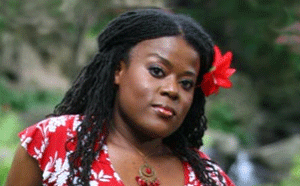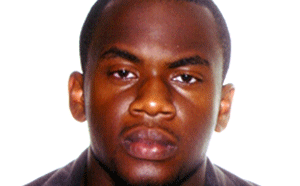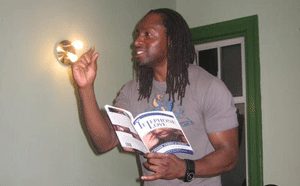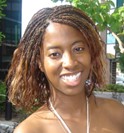Toronto is certainly a hub of very talented and creative individuals with a lot to offer. Among those are some inspiring black poets and storytellers with both a gift for words and a dedication to uplifting their community with their pens. We have here chosen to feature the following griots: Jane Musoke-Nteyafas, Yannick Marshall, Yemi Aganga, heronJones, and Kathleen James (a.k.a. Strong).

Jane Musoke-Nteyafas: Butterflies of the Nile
Jane Musoke-Nteyafas is no stranger to the long-time readers of AfroToronto.com. Her controversial and engaging commentaries on interracial dating and standards of beauty have garnered much interest. Jane is not only a gifted writer and poet but also a remarkable visual artist and playwright. The globetrotting daughter of Ugandan diplomats, she speaks English, French, Spanish, Danish, and Luganda.
She has a growing list of awards, including the Planet Africa Rising Star Award and the Miss AfriCanada Beauty pageant. Just last month, she received the African Canadian Women Achievement Award.
In her recently published collection of short stories entitled Butterflies of the Nile, Jane Musoke-Nteyafas tackles head-on the very contentious issues of colourism, sexual abuse, self-esteem and racist standards of beauty.
“It is my hope that through my short stories and other writings, I am able to assist young girls and women who have been affected by the lies about beauty ...” says Musoke-Nteyafas.
Butterflies of the Nile explores the many painful stereotypes which rob black women and African people as a whole of their beauty and humanity. The main characters of each short story are Ugandan -- in homage to the author’s background and experience. But the refreshing frankness and depth of the characters make them universal. Moreover, as the author points out by saying, “It would be nice if people stopped assuming that all black people in Toronto were Jamaican,” the book gives a much-needed diversified Pan-African perspective.
For instance, “Nakimera’s Love” is a story about the cultural taboo of a Ugandan girl dating a member of an enemy clan. It is a gripping lesson on how the legacies of colonialism, neo-colonialism and the old “divide and conquer” tactics, still affect the everyday lives of black people in the continent of Africa and its Diaspora.

Yannick Marshall & Yemi Aganga: Old Friend, We Made This For You
“Dear Afrika, it took me four hundred years to understand that I love you, and I miss you very much.”
- From “Jambalaya” by Yannick Marshall
Old Friend, We Made This for You is a thought-provoking debut collection of poetry by two talented Pan-Africanist griots who take us on a powerful journey of cultural self-discovery. Yannick Marshall, who pens most of the poems, is a young Toronto-based poet of St. Lucian and Jamaican background. He has lived in Jamaica, St. Lucia, and Botswana. The co-author, Yemi Aganga, was born in Nigeria and currently resides in Lesotho. He has lived in both Botswana and the United States.
The two authors’ paths crossed when they both attended secondary school in Botswana during their teens. They join forces seamlessly in Old Friend, We Made This for You to demonstrate the interconnectedness of the Pan-African experience; one voice from Africa and the other from the Diaspora.
Characterized as “the most exciting and accomplished book of mainly Canadian poetry you will read (and feel) for years” by George Elliott Clark, this collection of poems explores many important themes of the Pan-African struggle, identity and ethos.
The authors lament the lack of unity in the global African family and how the evils of class and colonial heritage continue to shackle us. From an old man in Kingston, Jamaica, who kisses his teeth at the sound of bongo drums, calling it “boogoo boogoo music,” to the soul-stripped inner-cities of America where black goddesses “bleach the melanin off their skin,” Old Friend, We Made This for You is a call for a spiritual return to Africa.
Are we ready to “shut out the slums, the mills, the factories” when our “revolutionaries debate over wine and cheese?” By asking these questions, poet Yannick Marshall makes the salient point that a lasting revolution of consciousness can only be achieved by the masses of the people and through a requisitioning of the barriers of class.

heronJones: Telephone Love
“Folks, pick up the phone! Hear ye some Truth!” says George Elliott Clarke in the introduction of Toronto-based poet heronJones’ book Telephone Love. Indeed, this collection of poems kills you softly by recounting every frustrating, lustful and obsessive details of anyone’s love life.
Imagine reading on paper all the illogical and downright embarrassing thoughts that traverse your mind when you wonder whether or not you should call a date or lover. Is it too soon? Would I make myself look needy or downright psychopathic? Where would your innermost thoughts and insecurities lead you if you let them run unchecked?
Well, heronJones crosses that line for you ... and then some!
“Oh Nah, girl, I ain’t crazy. Girl, you ain’t seen crazy yet.”
From obsession to redemption, Telephone Love also examines the enthralling experience of finding true love and the heartbreak of feeling taken for granted with the poem “Who Pays the Rent.” The poem “Why Ask” touches on the thin line between friendship with other people and emotional cheating.
We keep people in our lives for many reasons. Sometimes, those reasons are not even known to us. Or is it that we fear looking at the truth head-on?
How do our choices affect the people we love? But, as they say, karma is a b****, and love is often the judge, jury, and executioner.
We even find a most ingenious cameo by Mr Jones, callously left out of Billy Paul’s famous song, who is back in the pages of Telephone Love telling the fellow meeting Mrs Jones at 6 o’clock at the same cafe: “Cause you see Mrs. Jones, she’s my wife. ... Well tomorrow I’ll be waiting there with my AK. ... I will hurt you so much. Yes, I will hurt you so much.” We definitely find heronJone’s remarkable skills as a slam poem in that piece.

Kathleen James (a.k.a. Strong): eXposed
Toronto-based spoken word artist Kathleen Judith James (a.k.a. Strong) says that her work is informed and inspired by African drumming and Caribbean storytelling. One of the authors featured in the T-Dot Griots anthology, she brings a sound appreciation and understanding of Toronto’s spoken word scene, as demonstrated by choosing it as the topic of her MA of History thesis from Queen’s University.
James indeed stays true to her alias with her collection of poems entitled eXposed.
She truly exposes herself by revealing in “The Slam Exposed” her sudden and helpless feelings of stage fright and dislocation as she initially ventured into the spoken word sphere. But in her piece “My Vision”, she also tells of her strength to overcome the rain and keeping her eye on the prize.
An overriding theme which many readers will relate to and find inspiration in is the idea of following one’s positive path along a sometimes treacherous road full of obstacles and temptations. The poems are classified according to three central themes: Insecurities, dreams, reality, and transitions.
“My Burden” talks about the gut-wrenching choices to weigh in the face of an unwanted pregnancy. Where do the fears of shame end, and where does the guilt of selfishness begin?
Her “Dreams” poems touch on love, both explored and unfulfilled.
In “Reality,” the poems delve into female empowerment and the need to stand tall in the face of adversity and disapproval.
Finally, the “Transitions” poems deal with falling out of love and the uneasiness of flailing loyalties and betrayal.
Needless to say, eXposed makes the reader experience a wide range of emotions. The question is: How eXposed do you want to be?





